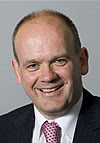
The Annual General Meeting of the London Assembly took place on Wednesday. The meeting saw the self styled Progressive Alliance of Labour, Greens and Lib Dems holding together for a second year, although the Libs in particular are beginning to look worried about the pressure this is placing on their small team.
The election for the chair of the assembly saw Darren Johnson defeat my Conservative colleague Andrew Boff. Darren is the first Green politician to hold the post and his success demonstrates the strong grip that the two Greens continue to exercise over their eleven non Conservative colleagues. Disproportionate power exercised by a few individuals is always a consequence of so called proportional representation.
I suspect that Darren will be more disciplined in the chair than his predecessor, indeed we got a taste of his style some months ago when he stood in at a question time and had noisy protesters thrown out of the gallery - a first for a Green politician in the UK.
Jennette Arnold defeated Conservative Victoria Borwick in the contest for deputy chair.
Chairs of assembly committees were then elected and the ruling coalition have generously permitted us to chair two committees:
James Cleverly returns to chair the Health Committee, where he has been leading some good work on alcohol abuse amongst teenagers.
And I have agreed to take on the Audit Panel...
An Undemocratic Stitch Up
During the debate some of my colleagues referred to the latest deal as an undemocratic stitch up. The position was defended by Labour members who claimed that the mayor's own party would not be sufficiently robust in scrutinising his actions and policies, yet it was acknowledged that many Conservative members have actually been very tough on the mayor and his advisers over the last year, in contrast to Labour's approach from 2004 to 2008.
Liberal leader, Mike Tuffrey who always ends up on the right side of any deal, is fond of pointing out that the present situation is no different from the deal he did with us from 2000 to 2008. He is wrong and it is worth examining what actually happened on previous occasions:
2000 to 2004
The deal was actually done between Labour and the Lib Dems and saw Labour's Trevor Phillips chair the assembly, alternating with Lib Dem Sally Hamwee and briefly Samantha Heath. this despite the fact that the mayor was also Labour and the Conservative and Labour groups both had 9 members. Mike wasn't present when this deal was drawn up, so he can be forgiven for trying to distance himself from a situation where one party occupied the mayoralty and the assembly chair - but it did happen.
2004 to 2008
This time the Labour group lost two members, shrinking to 7, whilst the Conservatives retained 9, whilst UKIP enjoyed a brief period of representation. The deal was done between Conservatives and the Lib Dems, leading to Brian Coleman's memorable period as chairman and a return for Sally Hamwee. On this occasion different parties occupied the mayoralty and the chair.
2008 to ????
Most recently, Labour recovered, gaining 8 members and the Conservative group grew to 11 - the largest ever elected to the assembly. A three way deal between Labour, Greens and Lib Dems was necessary for the opposition to retain control and the presence of one BNP member introduced another unpredictable variable. The mayor and the assembly chair will be from different parties.
On the face of it, the doctrine that the two organisations should be in different political hands looks attractive, but it fails to consider other important factors:
Boris Johnson has not excluded other parties in the way that Ken Livingstone did. Mayoral advisers include Labour figures Neale Coleman and Kate Hoey MP. Saturday's State of London Debate included contributions from Assembly Members of all parties - for the first time. Boris has a naturally more collegiate approach than his predecessor.
And the numbers create a challenge for the assembly. Trying to run an elected body of 25 members with only 13 leads to a considerable workload for those individuals, and particularly for the smaller partners. Recent plans to reduce the size of committees were intended to reduce some of this load but were vetoed when the smaller groups realised they would lose representation entirely on some of the committees.
An assembly elected on the same day as the mayor will usually have the mayor's party forming the largest group, so it seems unlikely that the voters, or the government, intended them to automatically be placed in opposition as Tuffrey claims.
Possible Solutions
Scrap Proportional Representation - it leads to disproportionate power.
Stagger the assembly elections to take place every five or every three years. Most of the time they would then be independent of the influence of the mayoral election, and would provide a useful mid term test of the mayor's popularity.















